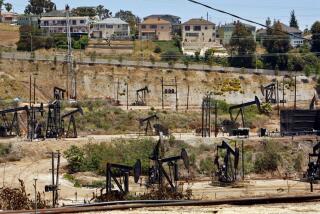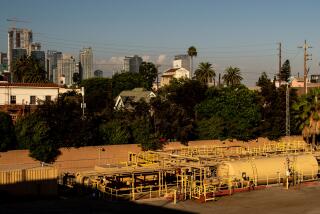Kuwait to Ignite Wells to Quell Harmful Gas
- Share via
KUWAIT CITY, Kuwait — With more than 500 oil wells already blazing out of control, Kuwait’s oil minister announced plans Friday to set fire to even more wells to stop them from spewing clouds of potentially lethal gas over the country.
At the same time, the minister, Rashid Salim Amiri, disclosed that millions of gallons of crude oil gushing uncontrollably from damaged wells are forming vast petroleum lakes that threaten to flood the eastern outskirts of Kuwait city.
Workers have begun erecting sand barricades to block the spreading oil from covering highways that are already barely passable in spots because of bomb damage.
“The crude,” Amiri said, “is all over the place. . . . This danger exists, and we have to move fast to prevent it.”
He appealed for international help, saying even though the Kuwait government has contracted with four companies to fight the oil-well fires and spills at a cost of $1 million to $2 million a day, that effort will not be enough.
“The magnitude of the problem is becoming larger and larger every day . . ,” he said at a news conference. “To tackle the problem is beyond Kuwait, beyond the Gulf area. I hope the world can handle it.”
The most pressing aspect of the problem and Kuwait’s priority, Amiri said, is the “huge amounts” of hydrogen sulfide leaking from at least five of 35 wells that were blown up by the Iraqis but did not catch fire.
Other wells among the 35 that are damaged may also be leaking the poisonous gas, but officials have been unable to get close enough to take air samples. Many of the wells are ringed by Iraqi land mines and unexploded cluster bombs dropped primarily by U.S. aircraft. Moreover, much of the government’s measuring equipment was stolen by Iraqi troops when they retreated from Kuwait last month.
By purposely igniting the wells that are known to be leaking, according to Amiri, the hydrogen sulfide will be reduced to less hazardous gases.
Two wells spewing hydrogen sulfide already have been ignited in recent days, he reported.
Their plumes of flame, however, will hardly make a difference in a surreal landscape where the roiling red and gold flames of dozens upon dozens of fires extend as far as the eye can see. Smoke from the fires turns day into night for anyone who dares pass through the inferno, while at night, the orange glow of burning oil can be seen 100 miles away.
Kuwaiti officials and those from the U.S. Environmental Protection Agency have expressed concern about the potential effects the smoke from the fires may have on the health of people living in Kuwait, Saudi Arabia and other Persian Gulf states.
Oil smoke carries a number of toxic chemicals, including known carcinogens.
Amiri acknowledged that he has experienced ill effects from the smoke--”I can feel it in my nose and my throat and my eyes”--but he rejected the notion that population centers in the smoke’s path should be evacuated.
In taking stock of their decimated oil industry, Kuwaiti officials have concluded that Iraqi troops damaged more than 80% of the country’s wells, while nearly every one of its petroleum support and transport facilities was damaged in some way.
Officials have estimated that it may take as long as three years to fully extinguish the flames and restore the industry to its standing before the Iraqi invasion last summer, when Kuwait exported 1.5 million barrels of oil a day.
At present, it is only able to supply about 50,000 to 60,000 barrels daily, all of it for use by Kuwaiti citizens.
Amiri said about one in five wells currently burning will be relatively easy to put out.
Another one in three, where damage is more extensive, will not be so easy to extinguish and will require “directional drilling,” he said. The complicated process, which can take as long as three months per well, involves boring two shafts diagonally next to the burning well--one to pump out oil and the other to inject mud and cement to plug the old well.
As for the remaining wells that are on fire, Amiri said he does not know whether the job will be simple or difficult because authorities have not been able to get close to the wells.
Amiri was among the Kuwaiti Cabinet ministers who resigned en masse this week as the country seeks to rebuild itself in the wake of the devastation wrought by Iraq. But like his colleagues, he is continuing in the post until a successor is named.
“I really feel a great pity for the next oil minister who will take over this crisis,” he said.
More to Read
Sign up for Essential California
The most important California stories and recommendations in your inbox every morning.
You may occasionally receive promotional content from the Los Angeles Times.










